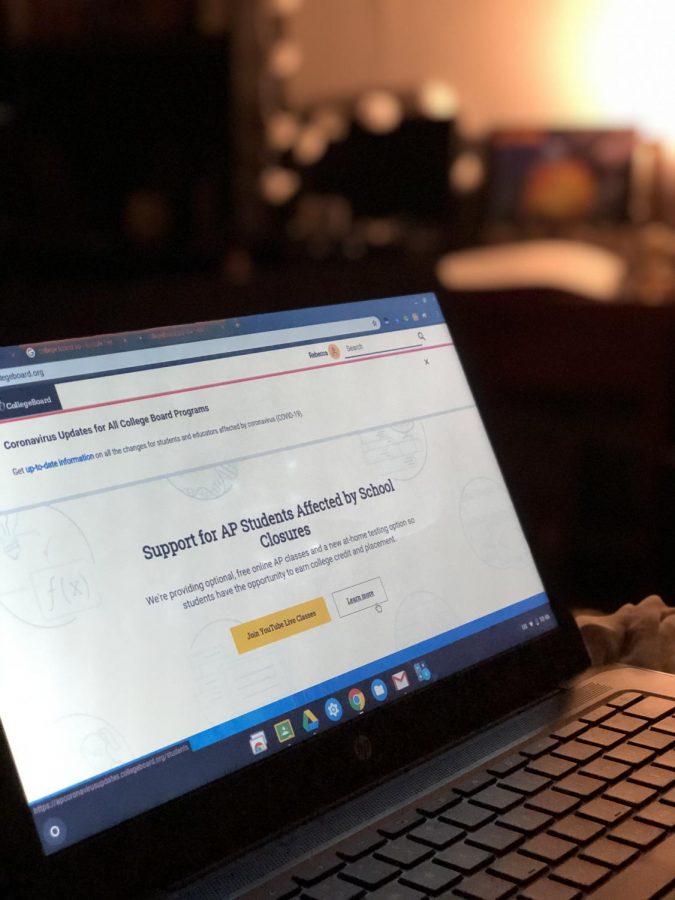Reworking the AP exams
With a global pandemic in full swing, many things have been thrown for a loop – including this year’s 2020 AP course exams.
AP College Board. Despite the recent in school shutdowns, AP College Board continues to put out online resources to help AP students review. The option to take online AP exams has also been offered by College Board. “Students will be given links to YouTube videos and other resources on the College Board website,” BHS counselor Barb Coyle said.
May 1, 2020
With the continued threats of the COVID-19 virus, many schools have had to find creative fixes for the quarantine shutdown. Canceling classes and turning to online solutions have answered many questions already, but what about the AP exams? While they are supposedly still on, there are still some new aspects to be worked out.
AP exams are taken towards the end of May by self-motivated students enrolled in an Advanced Placement class. There is an opportunity to earn potential college credit if a qualifying score – that is, a 3,4 or 5 – is earned on the exam.
“Students take it to earn the college credit and to get more points for the letter grade they earn, which can increase their GPA,” BHS counselor Barb Coyle said.
Traditionally, students taking an AP course would have the opportunity to take the written AP exam in May, but with the recent global events, there have been some new changes.
“It is going to change the entire outlook of the tests,” Coyle said. “Instead of monitored, three to four hour exams that include multiple-choice and response questions, the students will now have 45 minute, free-response questions.”
Usually, the exam would be given locally and distributed by the College Board, but now, students will have to access it online via an email link and log-in.
“There is a new schedule for when the tests will be available,” Coyle said. “Students will be emailed a link to login to the test and will submit them electronically using their phone, Chromebook, etc. when finished.”
However, just because the exam is online does not mean students will have to type out their answers. The option to handwrite their responses has been offered to those who prefer to write rather than type.
“I’m planning on typing because I know I can [answer] faster and more effectively if I’m typing,” BHS sophomore AP biology student Grace Stroh said.
Since the exam is now online, measures are being taken to prevent and monitor test-takers from cheating, such as plagiarism checkers and handwriting cross-references.
“The exam will be sent back to AP teachers so they can check to see if the work is consistent with their abilities, style and handwriting. The College Board will also check answers for similarities to online sources and other students’ work,” Coyle said.
Though they may seem harsh, the consequences of cheating – which include the loss of any potential college credit – are put in place to ensure that students are showing colleges what they are really capable of, rather than what past students have done.
“Anything suspicious will be investigated. If a student is found guilty of cheating, the colleges they applied to will be notified,” Coyle said.
Since most in-school classes have been canceled, AP College Board has elected to omit certain parts of the typical curriculum. As of now, only material usually covered through quarter three will be included.
“I think it’s great,” Stroh said. “It would be unfair if we had to take an exam on stuff we didn’t learn.”
Despite the new conditions and obstacles, the AP exams will still hold the same values as before in terms of credibility for colleges.
“Obtaining qualifying scores will still be looked at by colleges and universities for advancement and credit,” Smallbeck said.
Though the exams will be open note and open book, students’ tests will still be timed, meaning they are responsible for watching their time and will have to prepare in advance before test day.
“Students will be given 45 minutes to read, respond and upload their answers,” Coyle said. “There’s not a lot of time to go digging through materials.”
To help students prepare for the test day, the College Board and the National Math and Science Initiative (NMSI) are putting out online resources like review sessions for students to view, alongside anything assigned by their AP teachers.
“I am trying to provide as many resources as possible to review the units that they are going to be covering on the exam,” BHS AP biology teacher Valerie Smallbeck said. “I am encouraging that students participate in the College Board’s live review sessions and the review sessions that are offered through NMSI.”
Although the online exam is only a temporary solution to the current circumstances, whether or not they continue to incorporate more technology into future tests is still up in the air.
“I definitely think that is the direction AP is planning on taking us, whether it’s a completely online test or a combination of pen, paper and online,” Coyle said. “The main thing would just be a properly equipped room and having technology support in the building in case there is an issue with a computer or the internet.”
Despite being a whole new structure fill with learning curves, one thing is for certain – there are just some things that technology cannot make up for.
“I miss collaboration and socializing,” Smallbeck said. “I miss my students.”


